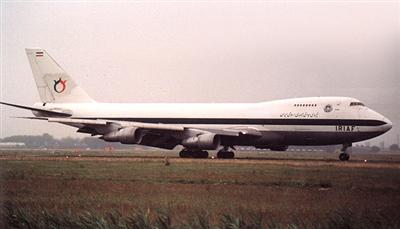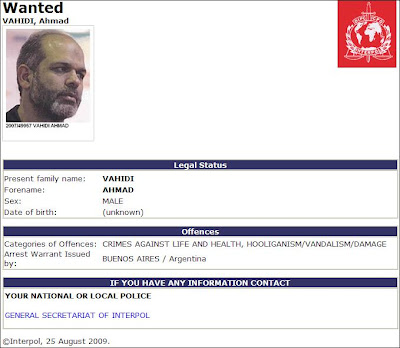
The image above is a screen capture from the al-Jazeera web site - it was their lead story this morning. The news of 'Abd al-Basit al-Maqrahi's release from a Scottish prison traveled not only around the Western world, but the Arabic-speaking world as well. You can tell from the photo the thoughts of al-Maqrahi's wife 'Ayishah, seen holding the sign.
The text of al-Jazeera's article was fairly subdued. The lead paragraph reads (my translation):
"Scottish Minister of Justice Kenny MacAuskill decided to release former Libyan intelligence agent 'Abd al-Basit al-Maqrahi (age 57), convicted in the Lockerbie explosion case, for humanitarian reasons after learning of his impending death due to advanced cancer."
I have often expressed skepticism that al-Maqrahi was a major actor in the bombing attack that destroyed Pan Am 103, killing 270 people in December 1988. If that is the case, who do I think did it?
To answer that, I want to recall a few events that led up to the attack on Pan Am 103. In 1987, Iran and Iraq had been at war for seven years - casualties from the bloody conflict were approaching one million. Although there had been U.S. Central Intelligence Agency efforts to assist the Iraqi armed forces with intelligence information as early as 1984, these never proved to be effective, owing to mistrust on both sides. By late 1987, however, the Iraqis were beginning to falter under the relentless attacks by the numerically superior Iranians who mounted fanatical human wave assaults on Iraqi troops positions.
In early 1988, the Defense Intelligence Agency prepared an assessment that concluded Iran would likely emerge victorious if the conflict continued another year. Present Reagan declared that an Iranian victory was unacceptable to American interests - he directed the Department of Defense to take steps to ensure that victory did not happen. The result was a Defense Intelligence Agency effort to provide intelligence information to the Iraqi Directorate of Military Intelligence. I was one of two officers assigned to execute this effort.
The effort was successful. With American intelligence information, along with the Iraqi use of modified Scud (al-Husayn) missiles and chemical weapons, Iraq was able to force the Iranians to accept a cease-fire in August 1988.

Iran Air Airbus EP-IBU - destroyed July 3, 1988
Just a month earlier, there was a critical event in the Persian Gulf. On July 3, an Iran Air passenger jet on a flight from Bandar Abbas to Dubai was mistakenly identified as a fighter aircraft by the USS Vincennes and shot down, killing all 290 passengers and crew. I have met with several Iranian officers since that incident - they all believe the shoot down was intentional and intended to send a message to Tehran that the United States would not permit Iran to prevail in the war with Iraq.
When Iran accepted the ceasefire in August, they declared that they were capable of defeating the Iraqis, but not both the Iraqis and the United States. The Iranians have never forgotten our assistance to the Iraqis and the shoot down of Iran Air 655. Those are two reasons we should not have been surprised when Iranian Islamic Revolutionary Guard Corps (IRGC) officers and Iranian-made weapons showed up in Iraq following the U.S, invasion in 2003.
Having failed to defeat the Iraqis, the Iranians wanted revenge against the "Great Satan." How better to avenge the death of 290 passengers and crew on an Iranian airliner than to destroy an American passenger jet. What better target than an airline that has the word "American" in its name?
Here is where the story - let's call it my analysis - takes on truly "bazaar" and bizarre dimensions. There are countries and groups that wish us ill, many for our support of Israel. One such group is the Damascus-based Popular Front for the Liberation of Palestine-General Command (PFLP-GC), headed by Ahmad Jibril. Jibril's group had long been supported by the IRGC.
Who better to turn to than a known terrorist group with experience in explosives and hijackings? At some point in the fall of 1988, IRGC officers met with members of the PFLP-GC, possibly with Jibril himself. The Iranians certainly have enough money and other means of support that would be of interest to Jibril. In return, Jibril agreed to bomb an American airliner. In other words, the Iranians contracted out the hit, hoping to hide the Iranian role in the operation.
The PFLP-GC is in its own perverse way a very talented organization. Their bomb-makers have exhibited expertise in constructing improvised devices that are hard to detect. To bring down a pressurized commercial airliner flying at high altitude does not require a large explosive device. The trick is getting the device onto the aircraft and ensuring that the detonation occurs after the aircraft has reached a suitable altitude for a small device to be effective. The PFLP-GC bomb makers in Syria constructed at least five suitable devices - four were found, and I believe the fifth was the bomb that brought down Pan Am 103.

Depiction of cassette player-bomb
The explosive device used was concealed in a Toshiba cassette tape player. The explosive material was Semtex, the preferred explosives of terrorist organizations world wide. Until recently, the principal chemical components of Semtex, RDN and PETN, were hard to detect. It was also sold in huge quantities to Libya and Syria, among others.
In order to get the bomb onto the aircraft, the PFLP-GC may have enlisted the help of 'Abd al-Basit al-Maqrahi and another Libyan intelligence officer accused but not convicted, al-Amin Khalifah Fahimah. The investigation revealed that the bomb, hidden in the Toshiba cassette player, was packed in a Samsonite suitcase. That suitcase was placed into the interline baggage system at Malta International Airport earlier that day aboard Air Malta KM180 which moved the bag to Frankfurt, where it was placed onto Pan Am 103A (a feeder flight), flown to London and later transferred onto the Boeing 747 that operated as Pan Am 103.
'Abd al-Basit al-Maqrahi's cover position was as chief of security for Libyan Arab Airways (LAA); his intelligence service colleague Fahimah's cover was as LAA station manager at the airport in Malta. Certainly they played a role in routing the bomb-laden suitcase onto Pan Am 103. What is not known is whether al-Maqrahi and Fahimah acted alone for the PFLP-GC - who would not be adverse to recruiting the Libyans - or whether Libyan leader Mu'ammar al-Qadhafi sanctioned their participation.
The fact that Qadhafi gave up the two intelligence officers is persuasive to me that this was a rogue operation. If Qadhafi authorized the Libyan intelligence service to conduct the operation with the PFLP-GC and then gave up two of its officers, he broke faith with his intelligence service. We intelligence officers routinely broke the laws of other countries, knowing full well that our government would never break faith with us. For that reason, I tend to believe that the two were operating on their own, probably for a large amount of money, and got caught. Qadhafi gave them up and took the blame to make peace with the West.
Is al-Maqrahi guilty? Yes, of course. Is Fahimah also guilty? Most likely - their airline covers were crucial to getting the bomb on board the Pan Am jet. That said, it was probably not sanctioned by Qadhafi. The money Libya paid in compensation is minor compared to the benefits resulting from the subsequent suspension of sanctions and later restoration of diplomatic ties with the West, including the United States.
The bottom line: the unproven culprits who have never been brought to justice for the murder of 180 American and 90 others live free in Damascus and Tehran.














.jpg)

